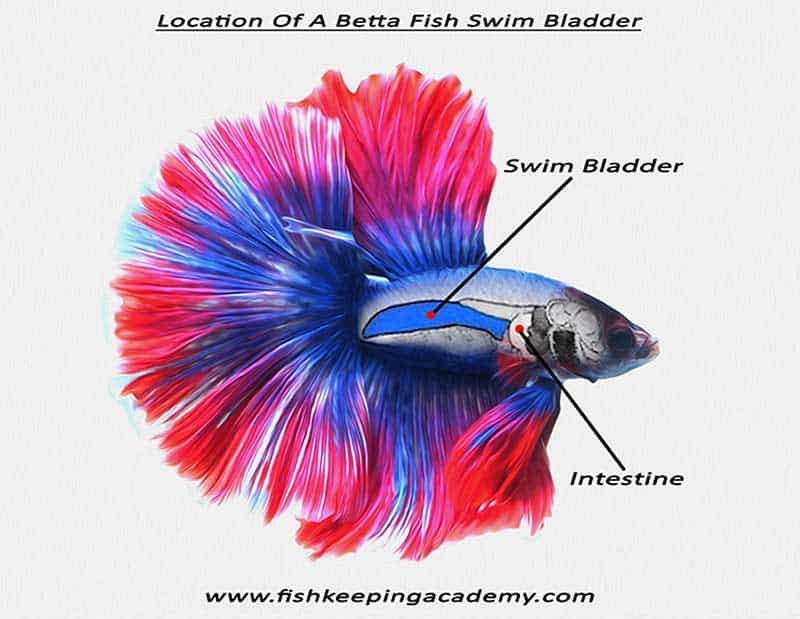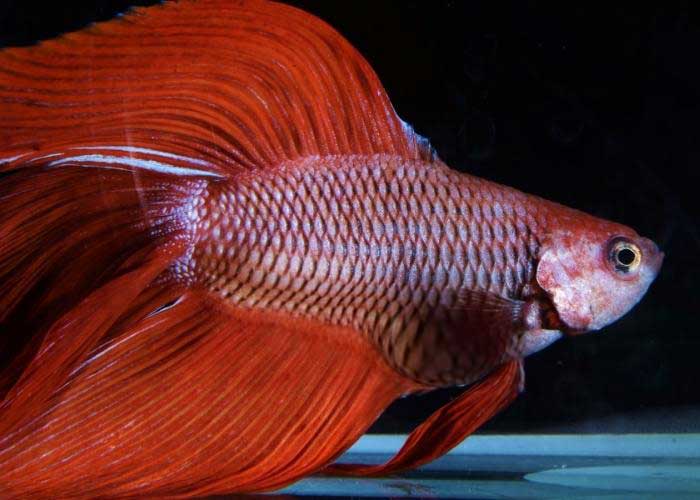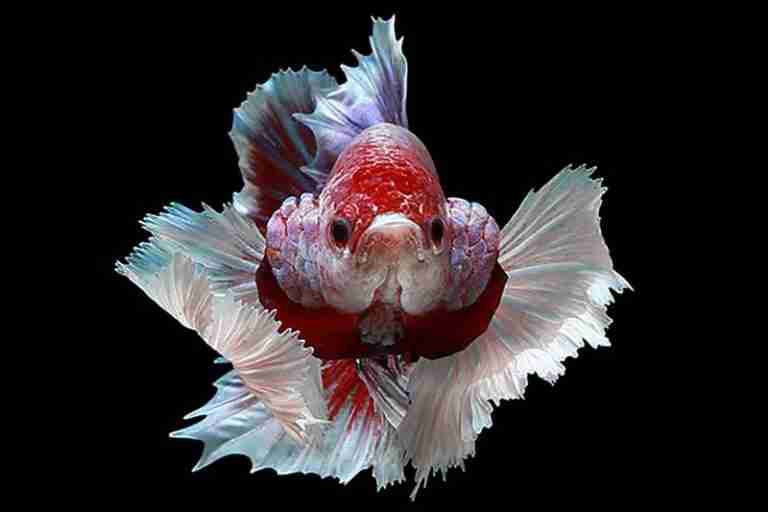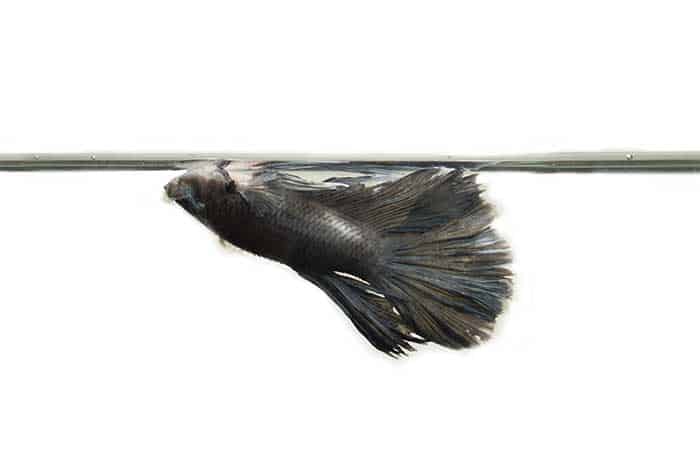Swim Bladder Disease In Bettas (Causes and treatment guide)
Swim bladder disease in bettas is quite common. Also called swim bladder disorder, it is not a disease in itself, instead, it is caused by another disease or condition affecting your betta fish. Swim bladder disease only affects a betta fish’s ability to swim, and it is not usually life-threatening.
This post will answer all of your questions about how Swim Bladder Disease affects betta fish, such as:
- What is a swim bladder?
- What can happen if a swim bladder becomes infected or is not working correctly?
- What conditions can cause swim bladder disease in bettas?
- How to treat swim bladder disease in bettas?
This article will also go over how to cure betta swim bladder disease. I will provide some links to additional information on several underlying conditions that can lead to swim bladder problems.

If you are new to betta fish care, I have a great article on betta fish care, which provides a great deal of helpful information.
What Is A Swim Bladder In Betta Fish?
A swim bladder is a gas-filled internal organ used as a buoyancy aid. It can be inflated or deflated with oxygen by the betta fish. As the swim bladder inflates, the betta fish will rise to the surface, and as it deflates, the betta fish will sink.
When a betta uses their swim bladder, it is as natural as breathing, and betta fish can easily find the correct level of inflation required to remain stable at their chosen depth.
A bettas swim bladder will also help it remain balanced in the water instead of rolling around uncontrollably, on its side, upside down, or with its nose or tail in the air.
Most bony fish have a swim bladder (including all bettas), but fish such as sharks and rays do not. Sharks and Rays use their forward motion to ascend or descend, which is easier because of how water is transferred over their fins.
Fish that spend their lives on the bottom of the ocean don’t require a swim bladder.
What Is Betta Swim Bladder Disease?
Swim bladder disease in betta fish is also called Swim Bladder Disorder and is less commonly known as Flip Over.
Swim bladder disorder is caused when your betta fish becomes affected by another disease or condition which hinders the swim bladder’s ability to inflate or deflate properly for balance.

Because an underlying condition usually causes betta swim bladder disorder, treatment is usually a simple case of successfully diagnosing and treating the underlying disease.
Gastrointestinal problems are one of the leading causes of swim bladder disorder in betta fish because of the internal swelling and bloating it can cause. An increase in pressure can press against the swim bladder affecting its ability to function correctly.
Swim bladder disease in betta fish is rarely fatal by itself. The underlying condition causing the swim bladder disorder may become fatal if it is not treated.
What Causes Swim Bladder Disease In Bettas?
Many conditions can cause swim bladder disease in bettas, and it would be difficult to discuss all of them, so instead, this article will discuss the most common causes.
Swim bladder problems in betta fish are most commonly caused by:
- Over-Feeding – If your betta fish eats too much, it can result in a swollen stomach which will press against the swim bladder and stop it from inflating correctly.
- Constipation – When there is a blockage in a bettas bowel, your betta will become constipated. This blockage can press against the swim bladder, reducing how much it can be inflated. Using good quality betta food will help with digestion. Too many dried foods can expand inside your betta’s stomach, cause severe bloating, and lead to constipation.
- Poor water quality – Swim bladder disease caused by a build-up of ammonia, nitrites, and nitrates can upset how gas or oxygen enters the swim bladder causing it not to function correctly. Poor water conditions can also affect the immune system and make your betta more susceptible to an illness, causing swim bladder disease.
- Low water temperature – Betta fish can survive in water outside of the recommended range of 78° to 80° Fahrenheit (25.5° – 26.7° Celsius), but colder water can affect a bettas metabolism and slow down the digestive process, often resulting in a bloated belly. Any condition that causes bloating can affect how the swim bladder works.
- Parasitic Infection or Bacterial Infection – Also caused by poor water quality, internal parasites, and bacterial infections can cause damage and swelling, resulting in pressure against the swim bladder.
- Shock caused by sudden changes to water temperature or water quality – Betta fish are quite hardy and can live in pretty poor water conditions, however, betta fish prefer gradual changes in both water quality and temperature. Sudden changes can bring on shock, which can lead to digestive issues and illness, which may affect their swim bladder.
- Growths and tumors – Any form of growth or tumor inside the digestive tract can cause poor digestion and bloating, which can press on the swim bladder. If growths or tumors are growing outside of the digestive tract, they can also press upon the swim bladder, dependent on their location.
- Birth and genetic defects – Birth defects are usually easier for young fish to adapt to, and provided the function of the swim bladder is not impeded too much, young betta fish will usually live quite healthy lives. If the defect is severe, it may affect the betta’s ability to feed, and this can be fatal. A genetic defect that appears later in life can be more bothersome depending on its severity.
- Egg binding in female betta fish – A pregnant betta fish is actually pregnant with eggs that will be released when mating occurs or even if mating does not take place. Eggs within the female can sometimes bind together, making them difficult to release through the ovipositor. Swelling and bloating will happen until the eggs break down and can be released.
Betta Swim Bladder Disease Symptoms
Symptoms of swim bladder disease in betta fish are pretty easy to spot because they are confined to the betta’s swimming abilities.
The most common symptoms of swim bladder disease in betta that you need to look out for are:
- Floating at the surface, unable to descend.
- Staying at the bottom of the tank, unable to ascend.
- Trouble swimming with unstable, erratic swimming ability.
- Uncontrollable rolling motion.
- Floating vertically, either head up or tail up.
- Betta floating upside down.
- Pushed around the tank by its current.
A swim bladder issue will cause your betta to swim in a very unnatural way, and it can be quite distressing to watch your betta fish like this.
What Does A Betta With Swim Bladder Disease Look Like?
A betta with swim bladder disease will usually look quite normal physically except for the possibility of some bloating or a distended belly.

Parasites or bacterial infections will often present with skin lesions, while poor water conditions may also cause skin issues and breathing at the surface for long periods.
Once you have established that a swim bladder disorder is present, you must identify the underlying cause before giving the correct treatment.
If you don’t feel confident diagnosing yourself, it may be better to seek professional help. A misdiagnosis can lead to improper treatment and worsening of the underlying condition.
Betta Swim Bladder Treatment
There are many ways to treat a swim bladder disease in bettas because there are so many causes. The most common treatments of swim bladder disease in betta fish focuses on the digestive system.
If your betta’s stomach appears bloated, a simple change to its diet or providing some food that will have a laxative effect can cure the swim bladder issue quickly and can prevent swim bladder disease from returning.
Simply feeding daphnia or a frozen pea will often provide much relief to a constipated betta fish.

I have an article on treating betta constipation. It will provide all the information you will need to help diagnose a case of constipation and the best foods to treat it quickly.
How To Treat Swim Bladder In Betta Fish
To treat swim bladder, you will first need to diagnose the cause. Once you know that swim bladder is the issue, you will need to look for physical symptoms of the underlying illness.
Many treatments are available in fish stores and pet stores for parasites and bacterial infections.
Betta Swim Bladder Epsom Salt Treatment
Epsom salt is a common treatment for skin conditions in betta fish, and it is an excellent cure for constipation and other digestive issues.
Add some Epsom salt to a treatment tank (hospital tank) for your betta fish to bathe in. An Epsom salt bath has become a pretty common treatment and has gained a lot of positive feedback.
The video below will help guide you in using an Epsom salt treatment.
How Long Does Swim Bladder Treatment Take To Work?
In some cases, betta swim bladder treatments can work within a couple of days, and in other cases, they may take several weeks to work. Sometimes, swim bladder treatments may not work, and the condition may be permanent.
If you are struggling to treat swim bladder disorder in your betta fish and are concerned by its severity, you should consult a specialist for further advice.
Betta Swim Bladder Not Getting Better
Not all cases of swim bladder disease will improve, especially if genetic. Your Betta fish lifespan will be much longer if the swim bladder is not affected too badly, and they will live an otherwise healthy life.
If the condition prevents your betta fish from feeding and the buoyancy problems are causing injuries, the condition may eventually lead to death. It’s also interesting to note that a bettas behavior before death often includes the loss of function of the swim bladder.
If your bettas swim bladder is not improving, you must ensure that you are treating it correctly and persist with the treatment for several weeks or until the condition is cured.
Your bettas swim bladder disease symptoms are often best examined by a trained professional or veterinarian. The same is true for experienced aquarists, so a trip to the local fish store is another avenue to explore.
If your bettas swim bladder disease is drastically affecting their quality of life and causing them to suffer, you should consider euthanizing your betta fish which you can read more about here: How To Euthanize A Betta Fish.
How To Prevent Swim Bladder In Betta Fish
They say that prevention is usually better than a cure, so what are the best ways to prevent swim bladder in betta fish?
Below is a list of the most common ways to prevent swim bladder infections in betta fish:
- Regularly check tank water parameters, temperature, and cleanliness. This will help avoid an ammonia spike in the aquarium, which will also raise nitrate and nitrite levels.
- Regular water changes for a healthier tank and to avoid bacteria and parasite growth.
- Feed your betta a healthy, varied diet consisting of good quality live foods and provide a small amount of vegetation. This will help give your betta a healthy digestive system and avoid an enlarged stomach caused by constipation.
- Only feed your betta once or twice per day, and only feed it as much as it will eat in 5 minutes.
- Consider fasting your betta for 1 or 2 days a week. This will help keep your betta’s digestive system moving and help to prevent any digestive problems from occurring.
- Consider adding a small amount of aquarium salt to your betta’s tank, which will help prevent parasites and bacterial infections.
The simple tips above will go a long way in helping to prevent many of the health issues that can cause swim bladder disease in betta fish. Sadly it is impossible to prevent this condition altogether.
Wrap Up
If your betta fish is suffering from a swim bladder disorder, I hope the information above has helped you better understand the condition.
Because the swim bladder is basically an internal, inflatable bag, I think I have made it clear that a malfunctioning swim bladder that will not inflate or deflate correctly has been given the term “swim bladder disease.”
The underlying condition that causes the swim bladder to malfunction is far more likely to cause problems for your betta.
Many illnesses and diseases can reduce the swim bladder’s functionality, so it is crucial to correctly identify the condition to give the best treatment.
Pressure against the swim bladder is the leading cause of a malfunction mainly caused by gastrointestinal problems, so keeping your betta’s digestive system functioning well is very important.







